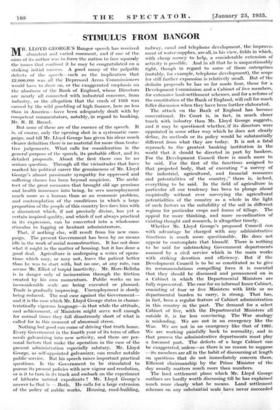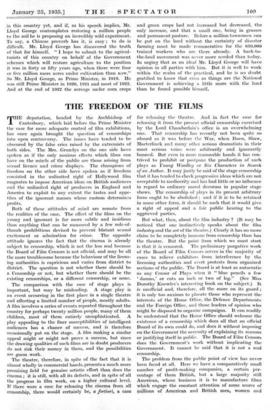STIMULUS FROM BANGOR
MR. LLOYD GEORGE'S Bangor speech has received abundant and varied comment, and if one of the aims of its author was to force the nation to face squarely the issues that confront it he may be congratulated on a striking initial success. A good many of the palpable defects of the speech—such as the implication that £2,000,000 was all the Depressed Areas Commissioners would have to draw on, or the exaggerated emphasis on the aloofness of the Bank of England, whose Directors are nearly all connected with industrial concerns, from industry, or the allegation that the crash of 1931 was caused by the wild gambling of high finance, here no less than in America—have been adequately dealt with by competent commentators, notably, in regard to banking, Mr. R. H. Brand.
But none of these are of the essence of the speech. It is, of course, only the opening shot in a systematic cam- paign, and till Mr. Lloyd George has given his ideas much clearer definition there is no material for more than tenta- tive judgements. What calls for consideration is the general purpose of the speech, its probable effect, and its detailed proposals. About the first there can be no serious question. Through all the vicissitudes that have marked his political career the genuineness of Mr. Lloyd George's almost passionate sympathy for oppressed and suffering classes has been beyond suspicion. The archi- tect of the great measures that brought old age pensions and health insurance into being, he sees unemployment much more as a human than as an economic problem, and contemplation of the conditions in which a large proportion of the people of this country live fires him with a discontent which, if not precisely divine, has yet a certain inspired quality, and which if not always practical in its expression, can be converted into a wholesome stimulus to lagging or hesitant administrators.
That, if nothing else, will result from his new cam- paign. The present Government has been by no means idle in the work of social reconstruction. It has not done what it might in the matter of housing, but it has done a good deal. Agriculture is undergoing a series of opera- tions which may, or may not, leave the patient better than he was to start with, but no one, at any rate, can accuse Mr. Elliot of torpid inactivity. Mr. Hore-Belisha is in danger only of incineration through the friction created by his own momentum. Public works on no inconsiderable scale are being executed or planned. Trade is gradually improving., Unemployment is slowly being reduced. The real case against the Government— and it is the case which Mr. Lloyd George states in charac- teristically vigorous language—is that while the attitude, and achievement, of Ministers might serve well enough for normal times they fall 'disastrously short of what is called for in this moment of abnormal stress.
Nothing but good can come of driving that truth home. Every Government in the fourth year of its term of office needs galvanizing into new activity, and there are per- sonal factors that make the operation in the case of the present administration especially salutary. Mr. Lloyd George, as self-appointed galvanizer, can rendei notable public service. But his speech raises important practical questions. Is the Government to be stimulated to pursue its present policies with new vigour and resolution, or is it to turn in its track and embark on the experiment of hitherto untried expedients ? Mr. Lloyd George's answer to that is — Both. He calls for a large extension of the policy of public works. Housing, road-building, railway, canal and telephone development, the improve- ment of water-supplies, are all, in his view, fields in which, with cheap money to help, a considerable extension of activity is possible. And in all that he is unquestionably right, though in regard to some of those enterprises (notably, for example, telephone development), the scope for still further expansion is relatively small. But of the definite proposals he has so far made four, those for a Development Commission and a Cabinet of five members, for extensive land-settlement schemes, and for a reform of the constitution of the Bank of England, will call for much fuller discussion when they have been further elaborated.
The attack on the Bank of England has become conventional. Its Court is, in fact, in much closer touch with industry than Mr. Lloyd George suggests, and it may be questioned whether, if its directors were appointed in some other way which he does not clearly define, its methods or its policy would be substantially different from what they are today. It is not a fatal reproach to the greatest banking institution in the world that it should be directed in part by bankers. For the Development Council there is much more to be said. For the first of the functions assigned to that projected body, that of executing " a survey of the industrial, agricultural, and financial resources and potentialities of the country," there is, indeed, everything to be said. In the field of agriculture in particular all our tendency has been to plunge ahead empirically without ever surveying the agricultural potentialities of the country as a whole in the light of such factors as the suitability of the soil in different regions for particular crops and forms of tillage. The appeal for more thinking, and more co-ordination of existing thought and research, is altogether timely.
Whether Mr. Lloyd George's proposed Council can with advantage be charged with any adthinistrative functions is much more questionable. He does not appear to contemplate that himself. There is nothing to be said for sidetracking Government departments manned by a civil service which in the main works with striking devotion and efficiency. But if the Development Council is to be so constituted as to give its recommendations compelling force it is essential that they should be discussed and pronounced on in a Cabinet in which the Departmental Ministers are fully represented. The case for an informal Inner Cabinet, consisting of four or five Ministers with little or no departmental burden to carry, is strong. That has, in fact, been a regular feature of Cabinet administration in this country in the past. The demand for a select Cabinet of five, with the Departmental Ministers- all outside it, is far less convincing. The War analogy is misleading. We are not in an emergency like the War. We are not in an emergency like that of 1981. We are working painfully back to normality, and in that process the administrative departments must play a foremost part. The defects of a large Cabinet can be exaggerated, unless—as there is no reason to suppose —its members are all in the habit of discoursing at length on questions that do not immediately concern them. Efficient chairmanship by the Prime Minister of the day usually matters much more than numbers.
The land settlement plans which Mr. Lloyd George outlines are hardly worth discussing till he has explained much more clearly what he means. Land settlement schemes on any substantial scale have never succeeded in this country yet, and if, as his speech implies, Mr. Lloyd George contemplates restoring a million people to the soil he is proposing an incredibly wild experiment. To say, a Chinese proverb has it, is easy ; to do is difficult. Mr. Lloyd George has discovered the truth of that for himself. " I hope to submit to the agricul- turists of this country on behalf of the Government schemes which will restore agriculture to the position it was in forty or fifty years ago, when there were four or five million more acres under cultivation than now." So Mr. Lloyd George, as Prime Minister, in 1919. He was still Prime Minister in 1920, 1921 and most of 1922. And at the end of 1922 the acreage under corn crops and green crops had not increased but decreased, the only increase, and that a small one, being in grasses and permanent pasture. Before a million townsmen can be put on the land without the certainty of disaster farming must be made remunerative for the 850,000 trained workers who are there already. A back-to- the-land movement was never more needed than today. In urging that as an ideal Mr. Lloyd George will have opinion in all parties with him. But it is well to work within the realm of the practical, and he is no doubt gratified to know that even as things are the National Government is achieving a little more with the land than he found possible himself.















































 Previous page
Previous page